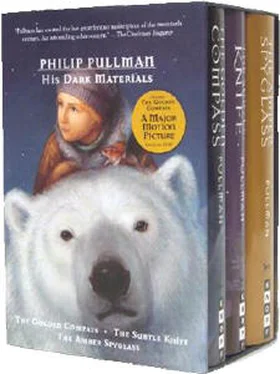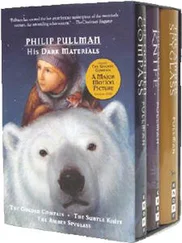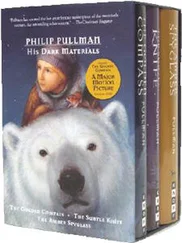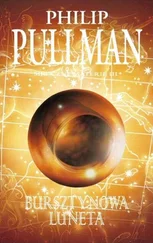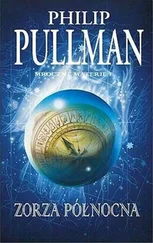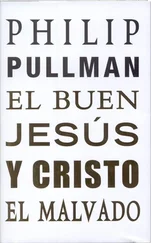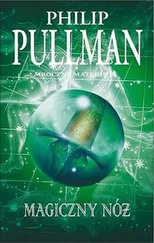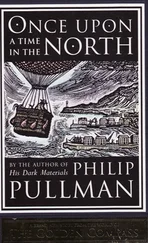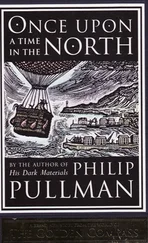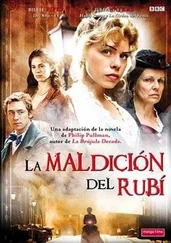In the early evening, when the cooking fires were lit and the first stars were coming out, a group of strangers arrived. Mary was washing; she heard the thunder of their wheels and the agitated murmur of their talk, and hurried out of her house, drying herself.
Will and Lyra had been asleep all afternoon, and they were just stirring now, hearing the noise. Lyra sat up groggily to see Mary talking to five or six of the mulefa , who were surrounding her, clearly excited; but whether they were angry or joyful, she couldn’t tell.
Mary saw her and broke away.
“Lyra,” she said, “something’s happened – they’ve found something they can’t explain and it’s… I don’t know what it is…I’ve got to go and look. It’s an hour or so away. I’ll come back as soon as I can. Help yourself to anything you need from my house – I can’t stop, they’re too anxious – ”
“All right,” said Lyra, still dazed from her long sleep.
Mary looked under the tree. Will was rubbing his eyes.
“I really won’t be too long,” she said. “Atal will stay with you.”
The leader was impatient. Mary swiftly threw her bridle and stirrups over his back, excusing herself for being clumsy, and mounted at once. They wheeled and turned and drove away into the dusk.
They set off in a new direction, along the ridge above the coast to the north. Mary had never ridden in the dark before, and she found the speed even more alarming than by day. As they climbed, she could see the glitter of the moon on the sea far off to the left, and its silver‑sepia light seemed to envelop her in a cool, skeptical wonder. The wonder was in her, and the skepticism was in the world, and the coolness was in both.
She looked up from time to time and touched the spyglass in her pocket, but she couldn’t use it till they’d stopped moving. And these mulefa were moving urgently, with the air of not wanting to stop for anything. After an hour’s hard riding they swung inland, leaving the stone road and moving slowly along a trail of beaten earth that ran between knee‑high grass past a stand of wheel trees and up toward a ridge. The landscape glowed under the moon: wide, bare hills with occasional little gullies, where streams trickled down among the trees that clustered there.
It was toward one of these gullies that they led her. She had dismounted when they left the road, and she walked steadily at their pace over the brow of the hill and down into the gully.
She heard the trickling of the spring, and the night wind in the grass. She heard the quiet sound of the wheels crunching over the hard‑packed earth, and she heard the mulefa ahead of her murmuring to one another, and then they stopped.
In the side of the hill, just a few yards away, was one of those openings made by the subtle knife. It was like the mouth of a cave, because the moonlight shone into it a little way, just as if inside the opening there were the inside of the hill; but it wasn’t. And out of it was coming a procession of ghosts.
Mary felt as if the ground had given way beneath her mind. She caught herself with a start, seizing the nearest branch for reassurance that there still was a physical world, and she was still part of it.
She moved closer. Old men and women, children, babes in arms, humans and other beings, too, more and more thickly they came out of the dark into the world of solid moonlight – and vanished.
That was the strangest thing. They took a few steps in the world of grass and air and silver light, and looked around, their faces transformed with joy – Mary had never seen such joy – and held out their arms as if they were embracing the whole universe; and then, as if they were made of mist or smoke, they simply drifted away, becoming part of the earth and the dew and the night breeze.
Some of them came toward Mary as if they wanted to tell her something, and reached out their hands, and she felt their touch like little shocks of cold. One of the ghosts – an old woman – beckoned, urging her to come close.
Then she spoke, and Mary heard her say:
“Tell them stories. They need the truth. You must tell them true stories, and everything will be well, just tell them stories.”
That was all, and then she was gone. It was one of those moments when we suddenly recall a dream that we’ve unaccountably forgotten, and back in a flood comes all the emotion we felt in our sleep. It was the dream she’d tried to describe to Atal, the night picture; but as Mary tried to find it again, it dissolved and drifted apart, just as these presences did in the open air. The dream was gone.
All that was left was the sweetness of that feeling, and the injunction to tell them stories.
She looked into the darkness. As far as she could see into that endless silence, more of these ghosts were coming, thousands upon thousands, like refugees returning to their homeland.
“Tell them stories,” she said to herself.
Next morning Lyra woke up from a dream in which Pantalaimon had come back to her and revealed his final shape; and she had loved it, but now she had no idea what it was.
The sun hadn’t long risen, and the air had a fresh bloom. She could see the sunlight through the open door of the little thatched hut she slept in, Mary’s house. She lay for a while listening. There were birds outside, and some kind of cricket, and Mary was breathing quietly in her sleep nearby.
Lyra sat up and found herself naked. She was indignant for a moment, and then she saw some clean clothes folded beside her on the floor: a shirt of Mary’s, a length of soft, light patterned cloth that she could tie into a skirt. She put them on, feeling swamped in the shirt, but at least decent.
She left the hut. Pantalaimon was nearby; she was sure of it. She could almost hear him talking and laughing. It must mean that he was safe, and they were still connected somehow. And when he forgave her and came back – the hours they’d spend just talking, just telling each other everything…
Will was still asleep under the shelter tree, the lazy thing. Lyra thought of waking him up, but if she was on her own, she could swim in the river. She happily used to swim naked in the river Cherwell with all the other Oxford children, but it would be quite different with Will, and she blushed even to think of it.
So she went down to the water alone in the pearl‑colored morning. Among the reeds at the edge there was a tall, slender bird like a heron, standing perfectly still on one leg.
She walked quietly and slowly so as not to disturb it, but the bird took no more notice of her than if she’d been a twig on the water.
“Well,” she said.
She left the clothes on the bank and slipped into the river. It was seawater coming in on the tide, and it was strange to Lyra, who had never swum in salt water before. She swam hard to keep warm, and then came out and huddled on the bank, shivering. Pan would help dry her, normally. Was he a fish, laughing at her from under the water? Or a beetle, creeping into the clothes to tickle her, or a bird? Or was he somewhere else entirely with the other daemon, and with Lyra not on his mind at all?
The sun was warm now, and she was soon dry. She dressed in Mary’s loose shirt again and, seeing some flat stones by the bank, went to fetch her own clothes to wash them. But she found that someone had already done that: hers and Will’s, too, were laid over the springy twigs of a fragrant bush, nearly dry.
Will was stirring. She sat nearby and called him softly.
“Will! Wake up!”
“Where are we?” he said at once, and sat up, reaching for the knife.
“Safe,” she said, looking away. “And they washed our clothes, too, or Dr. Malone did. I’ll get yours. They’re nearly dry…”
Читать дальше
